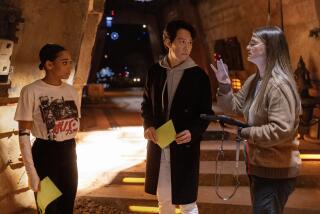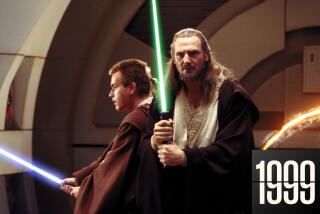‘Star Wars Jedi: Survivor’ is ‘Star Wars’ storytelling at its best
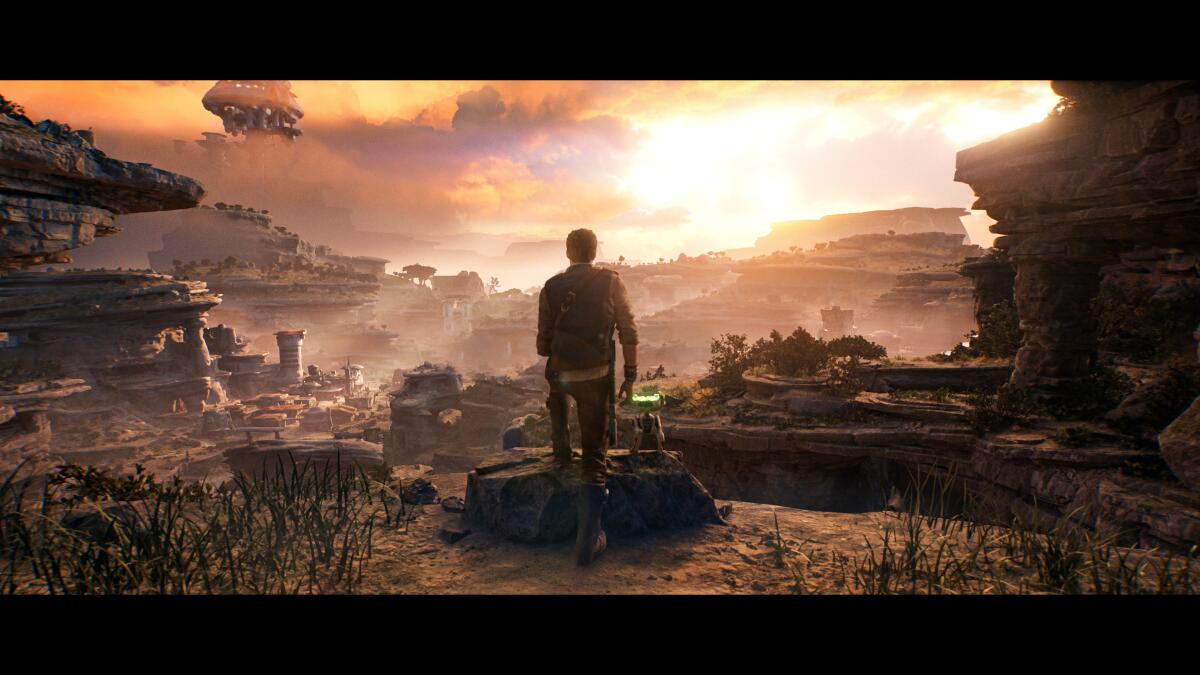
“Star Wars” in 2023 is sprawling, a franchise with numerous animated and live-action streaming series, books and theme park lands. I suspect that most fans who are interested in the brand pick and choose their spots, rather than try to keep up with it all. My favorite element of “Star Wars” these days is the one that’s in a physical space — Star Wars: Galaxy’s Edge at Disneyland Park. It’s a place to wander, explore and play, and a reminder that the original films created not just a new American myth but a world we wanted to get lost in.
Perhaps, then, it makes sense that I’ve taken so highly to “Star Wars Jedi: Survivor,” the latest large-scale video game from Sherman Oaks-based studio Respawn Entertainment. It’s also “Star Wars” at its most comfortable and old-fashioned, in the best way possible. Arriving at a time when series such as “Andor” and “The Mandalorian” are attempting to push “Star Wars” beyond its familiar slate of characters and stories, “Survivor” taps into a mix of action adventure, hokiness and light spirituality that can make even the largest and silliest of “Star Wars” tales feel somewhat personal.
“Survivor” is a love letter to the Jedi, those mystical yet superpowered beings who have often stood at opposite ends of the franchise’s moral compass. If “The Mandalorian” and, especially “Andor,” have shown us “Star Wars” can get along just fine without a preoccupation with the Jedi and their Force powers, “Survivor” shows us why Jedi stories matter. This is an action game — and an awfully challenging one, depending on how you adjust the difficulty settings — in which one’s relationship to the devotional lies at its heart. In a franchise that often relies on save-the-galaxy heroics, Jedi Cal Kestis (Cameron Monaghan) is starting to wonder if he should be after something more akin to a work-life balance.
Set after the events of the prequel trilogy but before those of “Star Wars: Episode IV – A New Hope” — broadly speaking, an era explored in “Andor” — Kestis is a Jedi on the run. In the first game, 2019’s “Star Wars Jedi: Fallen Order,” Kestis set out to rebuild the Jedi, a mission we know wouldn’t be a resounding success due to the events of the films and series set after it. Here, he’s still working for the budding rebellion and still seeking to preserve the Jedi, but is also starting to grapple with broader existential questions. It’s a game about external expectations placed on us, seeking to ask what it even means to be a Jedi and where we place our faith.
In other words, how much should our work define us?
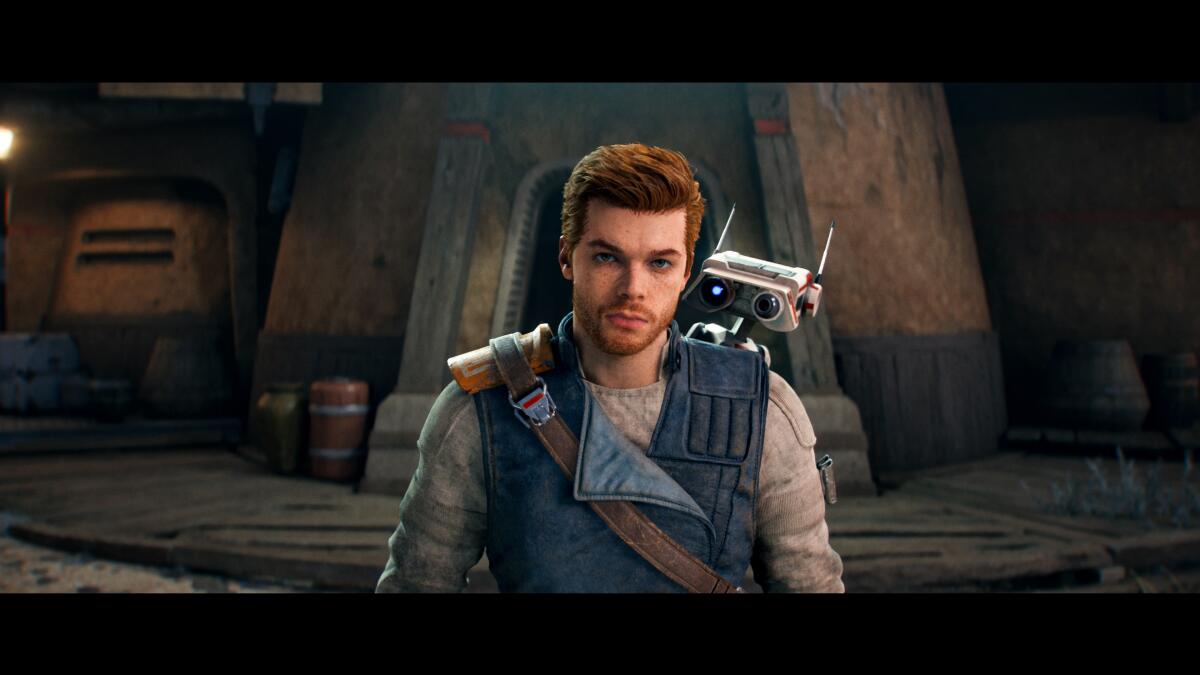
“To a certain extent, that’s the major decision Cal has to make,” says game director Stig Asmussen. “Is he chasing a pipe dream? Is he running away from something because it’s not achievable, and does he end up finding something that’s not even real?”
What struck me with “Survivor” is how patient it can be. After a rigorous opening in which Kestis is on a rebellion mission — one in which not every one of Kestis’ collaborators makes it out alive — the game dials down the action for a moment. I tend to be a player who focuses on exploration rather than action, playing often on lower difficulty levels, and it was about 10 hours of play time before the central mysteries of “Survivor” revealed themselves to me, when Kestis on the planet Koboh discovers a Jedi who’s been in stasis for decades.
“When we meet Cal at the beginning of the game, he’s almost got a restless drive to take the fight to the Empire,” lead writer Danny Homan says of the game’s slow-build. “After the opening and when you finally get to Koboh, both for the character and the player there’s a need to create a space for rest and self-examination of what they’ve been through. It’s a nice moment when you can find that confluence between story and design and what the player is feeling. ... By the time players arrive there, they need a little bit of that theme park moment to step off the golden path. It’s a moment of rejuvenation.”
Until this moment, the central drive of “Survivor” remained hidden, with Kestis ruminating on a successful opening mission, albeit one with great personal costs. What Kestis discovers is a tale of a hidden planet that could be a safe haven. Complicating matters is that long dormant Jedi, a figure dating back to the so-called High Republic era when Jedi reigned. But he’s no friendly face, having lost faith in the Jedi Order and palling around with some of the galaxy’s largest undesirables other than the evil Empire. Don’t worry, there are plenty of Stromtroopers after Kestis. Many of them are also humorously wondering about their station in life.
But the tone is set. “Survivor” isn’t a game of simply running and battling another foe hunting the Jedi. It’s an action game that strives for personal reflection — the efforts to maintain a sense of idealism amid numerous tragedies and personal disappointments . Also, when you’re destined to be selfless, maybe it’s OK to figure out a time to be a little selfish? Disney+ series “Obi-Wan Kenobi” grappled briefly with such internal conflicts. “Survivor” makes them the narrative focus. “Maybe it’s time to stop trying to fight back,” says Asmussen of Kestis’ personal journey, “because it’s not a battle that can be won.”
The balance among exploration, narrative and action works because battles are treated as strategic set pieces rather than the backbone of the game. “The story and the character are not the definers of the battle,” says creative director Dori Arazi. “They’re the definers of how you approach the battle. They’re the why and the emotional how. ... Cal’s angle is, ‘Who am I, relative to all these people who came before me, based on what I want to achieve?’ And what he may want to achieve is to kill that or blow that up.”
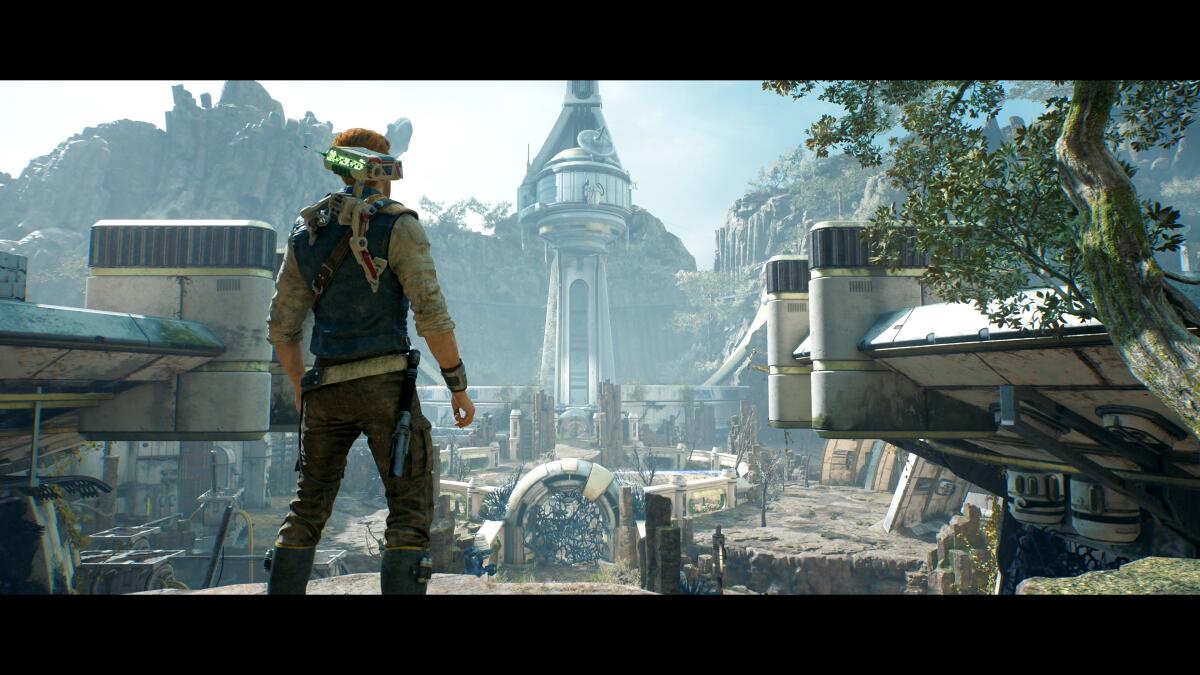
Of course, this is a video game that can stretch longer than 30 hours, especially if one takes the time to explore its various planets and moons. So there’s plenty of fighting, including a brutal battle with a scorpion-like creature on a desert planet. “Survivor” is big, and I often found myself deviating from the main path to hunt out hidden Jedi chambers, where the game switches the emphasis to environmental puzzles in which we use the Force to move objects and reveal hidden passageways. Respawn Entertainment head Vince Zampella says Asmussen initially envisioned the “Jedi” series as a trilogy. So perhaps don’t expect Kestis to choose permanent retirement.
“I think that’s the ‘Star Wars’ in me,” Asmussen says. “The original trilogy was a trilogy. And whatever game I’m working on I see as a story, and there’s something that happened before it and something that happened after it. These are things that we have to make sure, when we’re developing the plot of the game, that we’ve figured these things out so the story feels real. It feels like there’s actually bones to it. I found that worked really well in ‘Star Wars’ and with Lucasfilm. ... We always ask those questions. ‘What does this mean three years in the world of ‘Star Wars’ if we make this decision?’ It’s a good way to stress test a story.”
Key to “Survivor’s” success is the development of Kestis, a character who’s become so popular a model of his lightsaber is sold in Disney’s theme parks. As much as I enjoyed the first game, I felt Kestis a little rough around the edges — a brash but simple character that felt more like a stand-in for the player. “I don’t think we ever envisioned him as an avatar,” Zampella says. “I think it was more the character. He was an untrained Jedi.” Here, a full-fledged Jedi Knight, Kestis is more assertive, and we see his struggles and not just his power fantasies.
The game takes some risks with the character beyond just his emotions, such as making him the rare Jedi to wield a blaster as well as a lightsaber. And yet the game maintains a light-footed nature. Droids are bumbling, planets are filled with wildlife, and there’s an underlying vibe of reconnecting with old friends at its center. That cheery tone — the ability to find humor in challenging times — is what stands out to me with Respawn’s “Jedi” games and makes them as enjoyable as the best “Star Wars” stories.
“It’s something that’s indescribable,” Asmussen says. “I call it ‘Star Wars’ magic. There’s this impending doom. You’re constantly under pressure. The Empire is relentless and they’re hunting Cal down with extreme prejudice. But within those really dire times, there’s still moments of levity. There’s space to have humor and kind of lose your edge. Even though Cal might be weary, he hasn’t lost all hope. That’s how we persevere, ultimately.”
More to Read
The biggest entertainment stories
Get our big stories about Hollywood, film, television, music, arts, culture and more right in your inbox as soon as they publish.
You may occasionally receive promotional content from the Los Angeles Times.
